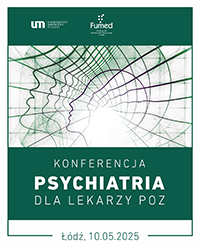Can we predict cognitive deficits based on cognitive complaints?
Ewa Małgorzata Szepietowska1, Anna Kuzaka2
 Affiliacja i adres do korespondencji
Affiliacja i adres do korespondencjiObjective: The aim of the study was to determine whether the intensity of cognitive complaints can, in conjunction with other selected variables, predict the general level of cognitive functions evaluated with the Montreal Cognitive Assessment (MoCA) test. Current reports do not show clear conclusions on this subject. Some data indicate that cognitive complaints have a predictive value for low scores in standardised tasks, suggesting cognitive dysfunction (e.g. mild cognitive impairment). Other data, however, do not support the predictive role of complaints, and show no relationship to exist between the complaints and the results of cognitive tests. Material and methods: The study included 118 adults (58 women and 60 men). We used the MoCA test, a self-report questionnaire assessing the intensity of cognitive complaints (Patient-Reported Outcomes in Cognitive Impairment – PROCOG and Dysexecutive Questionnaire/Self – DEX-S), and selected subtests of the Wechsler Adult Intelligence Scale-Revised (WAIS-R PL). On the basis of the results from the MoCA test, two separate groups were created, one comprising respondents with lower results, and one – those who obtained scores indicating a normal level of cognitive function. We compared these groups according to the severity of the complaints and the results obtained with the other methods. Logistic regression analysis was performed taking into account the independent variables (gender, age, result in PROCOG, DEX-S, and neurological condition) and the dependent variable (dichotomized result in MoCA). Results: Groups with different levels of performance in MoCA differed in regards of some cognitive abilities and the severity of complaints related to semantic memory, anxiety associated with a sense of deficit and loss of skills, but provided similar self-assessments regarding the efficiency of episodic memory, long-term memory, social skills and executive functions. The severity of complaints does not allow us to predict the level of cognitive functions. Older age, male sex, and neurological diseases all increase the likelihood of lower MoCA outcomes. Conclusions: Because of the large prevalence of complaints in the population of patients with neurologic deficits and healthy persons alike, and the difficulty in determining the significance of the complaints for the clinical psychological diagnosis/prognosis, it is necessary to expand the research to include biomarkers of brain pathology and other factors.






















